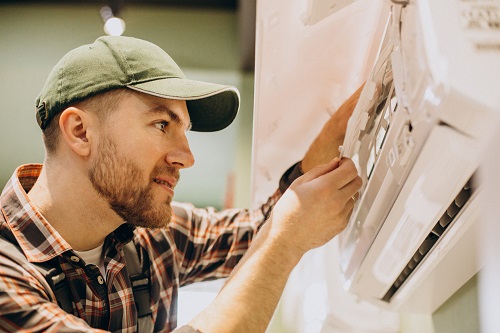There are some heating, ventilation, and air-conditioning (HVAC) technicians who complete schooling then practice both maintenance and installation work, but usually a technician will specialize in one or the other. So, this begs the question, which specialty is more fruitful which HVAC classes should you take. In this article we will explore the pros and cons of each specialization.
In a world where technology changes faster than you change your shirt, you can bet that new and improved HVAC systems come out every day. People will constantly want the latest and most efficient systems for their business or their home. However, a lot of installation work will depend on how the economy is fairing at the time.
If people have enough money to spend on new systems than the HVAC installer is in business. If construction is at a prime, than the HVAC installer will be making some bucks. However, though employers try to keep a full work week for both their maintenance and their installation employees throughout the year, it is true that maintenance jobs are steadier than installation ones, especially at a time where our country dips into a recession.
Maintenance workers do not have this recession problem. In fact, the recession works quite well for them as many people are keeping their old HVAC systems, and those systems will need repair. However, installation of new systems doesn’t hurt the maintenance worker either. Many companies require an installation be accompanied by a year-round service contract.
So if it is winter and the heater breaks down on a system the company installed, a maintenance worker will get those hours. Furthermore, when a high-tech, energy-efficient operation is installed, than the owner of that system is going to need help keeping the complex operation working at its optimal efficiency.

The one downside of maintenance work is that they are usually on call. An installer can set an appointment to put in a new system, but if the refrigeration system goes down at a restaurant, than that must be fixed right away. It is not uncommon for maintenance workers to work irregular hours either. If they do make an appointment to fix something, it is likely that the appointment won’t be during normal business hours, as most homeowners are off at work and businesses will probably want things to be fixed outside of business hours if they can help it.
A plus for both maintenance and installation HVAC workers comes from our country’s lawmakers and environmental lobbyists. Certain older types of refrigerants have proven harmful to the Earth’s atmosphere. Therefore, there is an increasing number of regulations being drawn up to prohibit the discharge and production of these pollutants.
That means, many air-conditioning systems will need to be modified (a plus for maintenance workers), or replaced (a plus for installation workers). This replacement of air-conditioning systems could happen even faster in the commercial and industrial sectors if federal or state lawmakers move to improve the tax rules aimed at inciting companies to buy new HVAC equipment.
In short, installation and maintenance work will both benefit from environmental and energy-conservation concerns that the law, companies, or individuals hold. With skyrocketing electric bills and environmental news stories on the television, many people are investing in advanced energy-saving heating and air-conditioning systems.
As this trend continues, rickety, old, energy-eating HVAC systems will either end up being modified or else replaced with up-to-date HVAC systems. So, no matter which way you look at it, the technology boom provides great HVAC career opportunities, whether the technician practices maintenance, installation, or both.
